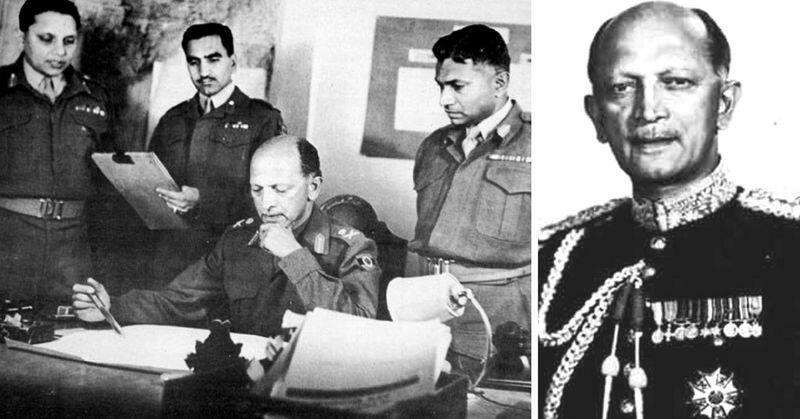
From Coorg To Command: KM Cariappa's Record Ascent
All but one came from elite feudal backgrounds or royal lineage and received the King's Commission- officially appointed as officers in the military after completing their education at the Royal Military College-after graduating from the Royal Military College, Sandhurst, or the Royal Military Academy, Woolwich in southeast London.
A pragmatic pause: India's 'Atmanirbhar Bharat' vision in defense yields to immediate needs
However, the one remarkable exception was a person destined for greatness. Born into a humble, yet proud, family in the former Coorg state (now Kodagu), he never left India until he was called to serve in World War II, writes Lt-Gen (retd) Baljit Singh in the Tribune.
On the night he was born (January 28, 1899), his maternal grandmother had a dream where she heard the thunder of horses' footsteps and drumbeats. She believed this meant the newborn would become a great military leader. This child, KM Cariappa, was born and raised in Mercara village, in Coorg, and later attended Presidency College in Madras.
Shortly after, in 1918, he qualified for the first group of teenagers to attend the Temporary School for Indian Cadets at Daly College in Indore. Upon being commissioned as a 2nd Lieutenant in the Indian Army on December 1, 1919, he spent the next two decades gaining combat experience along the turbulent North-West Frontier.
At the same time, he worked hard to become the first Indian to graduate from the Defence Service Staff College in Quetta, located in Pakistan. By April 1942, he was promoted to Lt-Colonel rank and took command of the 17 Rajput Battalion, once again becoming the first Indian to achieve this milestone.
During World War II, he worked in logistics. He started at the headquarters of the 10th Indian Infantry Division in Iraq and Syria and later, moved to the headquarters of the 26th Indian Infantry Division in Burma, part of General Slim's 14th Army. In this role, he embraced the 14th Army's motto: 'We'll handle the impossible right away, the difficult will wait'.
For his outstanding service, Lt-Col Cariappa was 'mentioned in dispatches', meaning that he was officially recognized in military reports for exceptional bravery or outstanding service, three times and was awarded the Order of the British Empire on April 5, 1945.
In the period before Independence in 1946, it was decided to send one army officer and three bureaucrats to the Imperial Defence College in London to improve their understanding of both political and military strategies. Brigadier Cariappa was selected as the army officer for this opportunity. He soon put that knowledge to use when another brutal war over Jammu and Kashmir broke out in October 1947.
Since Pakistan acted first, the Indian Army's initial response was not enough to meet the challenge and it looked like Ladakh might soon fall. In January 1948, Maj.-Gen. Cariappa, who was leading the Army Reorganization Committee, was promoted to command the newly formed Western Command. He became the first Indian to hold this position and was tasked with leading the war in Jammu and Kashmir.
True to his usual style, the very next day, the General was in Srinagar, offering inspiring leadership and firmly declaring,“We will not let Gen. Tariq capture Leh. We must stop this, and we will stop it... We've decided to move tanks up the Zoji Pass, something that's never been done before.” The rest is history, says Lt-Gen. (retd) Baljit Singh.
The J&K war ended on January 5, 1949, creating the perfect opportunity for the army to appoint an Indian Commander-in-Chief, as Gen. FR Roy Bucher's term was coming to an end. The choice was clear: Out of about 20 distinguished candidates, Lt-Gen. Cariappa stood out.
However, two other names were also suggested: Lt-Gen. Maharaj Rajendrasinhji of the Cavalry, who was the brother of the Jam Sahib of Nawanagar and Lt-Gen. Thakur Nathu Singh of Dungarpur. Despite this, both officers agreed that the honour of becoming India's first Commander-in-Chief should go to Lt-Gen. Cariappa, known as 'Kipper', because he was the seniormost Indian officer. This was noted by Air Marshal (retd) KC Cariappa in his father's biography.
Remembering Field Marshal Cariappa, the legend
The Indian government showed great respect, as seen in Sardar Patel's letter:“Your impressive achievements give us confidence in your ability to lead during this crucial time in our country's history. We assure you of our full support and cooperation.”
On January 15, 1949, a very upright man, accompanied by a young boy and a seven-year-old girl, visited the Gandhi Samadhi early in the morning. After taking his children home, Gen. KM Cariappa went to his new high office without any ceremony or Guard of Honour.
(The author of this article is a Defence, Aerospace & Political Analyst based in Bengaluru. He is also the Director of ADD Engineering Components, India, Pvt. Ltd, a subsidiary of ADD Engineering GmbH, Germany. You can reach him at: ...)
Legal Disclaimer:
MENAFN provides the
information “as is” without warranty of any kind. We do not accept
any responsibility or liability for the accuracy, content, images,
videos, licenses, completeness, legality, or reliability of the information
contained in this article. If you have any complaints or copyright
issues related to this article, kindly contact the provider above.


















Comments
No comment